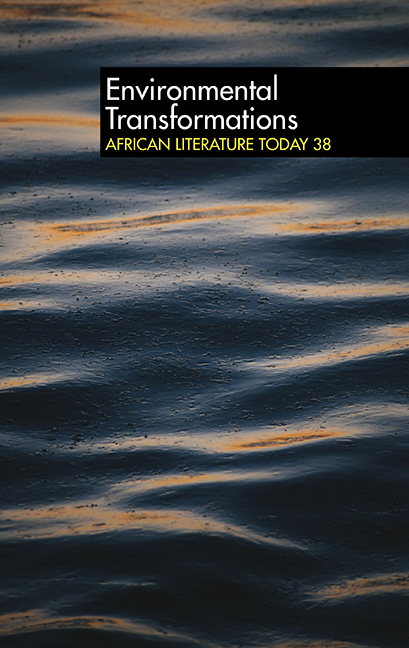Book contents
- Frontmatter
- Contents
- Notes on Contributors
- Introduction: Itinerariesof African Ecocriticism and Environmental Transformations in African Literature
- Literary Totemism and its Relevance for Animal Advocacy: A Zoocritical Engagement with Kofi Anyidoho’s Literary Bees
- Reading for Background: Suyi Davies Okungbowa’s David Mogo, Godhunter and ‘the end of the world as we know it’
- Poetics of Landscape: Representation of Lagos as a ‘Modernizing’ City in Nigerian Poetry
- Poetic Style and Anthropogenic Ecological Adversity in Steve Chimombo’s Poems
- Female Autonomy in Kaine Agary’s Yellow-Yellow
- Local Collisions: Oil on Water, Postcolonial Ecocriticism, and the Politics of Form
- ‘It is the Writer’s Place to Stand with the Oppressed’: Anthropocene Discourses in John Ngong Kum Ngong’s Blot on the Landscape and The Tears of the Earth
- Black Atlantic Futurism, Toxic Discourses and Decolonizing the Anthropocene in Nnedi Okorafor’s The Book of Phoenix
- Readings into the Plantationocene: From the Slave Narrative of Charles Ball to the Speculative Histories of Octavia Butler and Nnedi Okorafor
- INTERVIEW
- LITERARY SUPPLEMENT
- TRIBUTE
- REVIEWS
with Kenyan Novelist, Yvonne Owuor
Published online by Cambridge University Press: 07 November 2020
- Frontmatter
- Contents
- Notes on Contributors
- Introduction: Itinerariesof African Ecocriticism and Environmental Transformations in African Literature
- Literary Totemism and its Relevance for Animal Advocacy: A Zoocritical Engagement with Kofi Anyidoho’s Literary Bees
- Reading for Background: Suyi Davies Okungbowa’s David Mogo, Godhunter and ‘the end of the world as we know it’
- Poetics of Landscape: Representation of Lagos as a ‘Modernizing’ City in Nigerian Poetry
- Poetic Style and Anthropogenic Ecological Adversity in Steve Chimombo’s Poems
- Female Autonomy in Kaine Agary’s Yellow-Yellow
- Local Collisions: Oil on Water, Postcolonial Ecocriticism, and the Politics of Form
- ‘It is the Writer’s Place to Stand with the Oppressed’: Anthropocene Discourses in John Ngong Kum Ngong’s Blot on the Landscape and The Tears of the Earth
- Black Atlantic Futurism, Toxic Discourses and Decolonizing the Anthropocene in Nnedi Okorafor’s The Book of Phoenix
- Readings into the Plantationocene: From the Slave Narrative of Charles Ball to the Speculative Histories of Octavia Butler and Nnedi Okorafor
- INTERVIEW
- LITERARY SUPPLEMENT
- TRIBUTE
- REVIEWS
Summary
Yvonne Adhiambo Owuor's Dust (2014) scrutinizes carefully the multi-generational cycles of violence that have featured in Kenyan history. Rather than posit this in atavistic notions of tribalism, however, Owuor is interested in how tyranny can itself become a ritual: an act that is repeated seemingly with its own momentum. Kenya, as a nation-state that gained political self-rule from European colonial masters, nurtures a deep residue of state violence. Dust takes seriously the idea that human and ecological events are connected; that in fact these two influence each other. Without presenting a voyeuristic attitude towards violence, Owuor deftly invokes human mortality. The novel's plot, however, shows that death is not haphazard, either. Habits of impunity can be strongly entrenched, whether this is for colonial forces stamping out a peasant Land & Freedom (Mau Mau) rebellion, or twenty-first century crime-fighting units in Nairobi that shoot to kill. Impunity. Mortality. Habits. These three elements haunt the text. Owuor's Dust stretches its canvas from Turkana, Northern Kenya, to Brazil. Her characters occupy these spaces in ways that increasingly get us to question contemporary representations of lands and landscapes. The eponymous dust develops into a motif that connects humanity to the ecosphere. In Dust, landscapes come alive. Topographical features are portrayed as living entities, which I think greatly advances our ongoing discussions on how to mitigate climate change. Owuor asks that we re-imagine the oceans, polar ice caps, deserts, lakes, and rivers not as inanimate objects that we act on, but as subjects – and agents – in their own right. In this wide-ranging conversation, Owuor threads together the binary thinking developed during the Age of Reason with a long history of separating culture from nature, arts from sciences, body from soul. In this sense, her writing seeks to undermine an ontology of dualism. Owuor's second novel, The Dragonfly Sea (2019), is an expansive and lyrical ode to the cultural, spiritual, economic, and migratory patterns of the Indian Ocean. A third novel, tentatively titled The Long Decay, is in progress.
- Type
- Chapter
- Information
- ALT 38 Environmental TransformationsAfrican Literature Today, pp. 134 - 140Publisher: Boydell & BrewerPrint publication year: 2020



